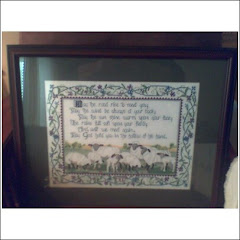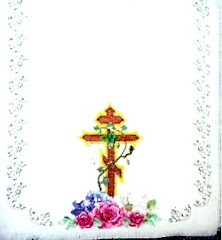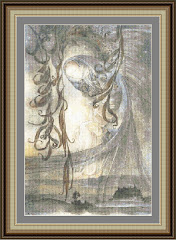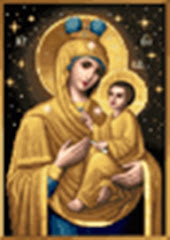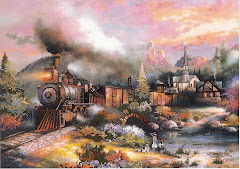Oh, dear. What is there to say about an Uncle Stanley? It was the biggest shock of our lives when we learned that he had cancer, and something like three weeks later, he was gone. He was just one of those people who was larger than life, and who influenced everyone who came into contact with him -- for good or ill.
My first memory of him is not a happy one. I don't know if I was even four yet, but I recall sitting in the big kitchen of my step-grandmother, on my stepfather's lap, and in walked Uncle Stanley with his partner, both in the heavy blue-serge winter uniforms of the New York City Police Dept., and Uncle Stanley roared (he never spoke), "Hup, there he is, there's Frinky-Dink! Come on, Frank, you're under arrest, we're gonna lock you up!"
Now, Mom and Dad weren't even married a year, and I think I must still have been trying to cope with my own father's death. At any rate, I burst into tears, and I remember Grandma scolding him, "Stanley, don't, you scared her," and Dad saying, "He's just joking." Let me tell you, it wasn't funny to think I was going to lose someone else! I never cared for Uncle Stanley after that, and he cordially returned the favor -- he hated crybabies.
Extrovert that he was, he was the one who hosted all the family parties, and there were dozens a year: birthday parties (for his kids), weddings and showers and christenings and First Communions, all accompanied by yards of Grandma's homemade kielbasa and salads (macaroni, potato, cucumber, and beet) and kegs of beer on tap -- heaven alone knows how he acquired those, and I don't think I want to know -- he was probably the most corrupt cop on the Force. He knew everyone, and he knew who was "touchable" and who wasn't. He probably felt it was the only way he could feed and clothe his nine kids -- his wife wasn't going out to work! (Ironically, after he died, she did just that, and as far as I know, is still at it, at age 75.)
His kids adored him. Some of them were quiet, and some extroverted, just like him, but they all had his blue eyes and flashing smile, and his competitive spirit. Why he was so competitive, I'll never know; Dad, the oldest of his parents' five children, is the most mild-mannered guy I know, and his other two brothers are equally low-key. But Stanley and his sister, Millie -- both had to have the best of everything in life, nothing was too good for them or for their kids, and both would do whatever they had to, to get it.
Whatever the cause, when he died, his kids were devastated. And maybe that's his greatest legacy, that despite all his faults (and who among us has none?), his kids were enormously proud of him and of the job he had done raising them. Which is not a bad way to be remembered at all.
Saturday, October 01, 2005
Tuesday, September 27, 2005
Uncle Jack: 1898(?)-1918
Still trying to figure out how to get my "picture" (I give you fair warning, it's a sheep!) on my settings page. The directions given by Blogspot aren't working. Phooey.
Anyway, it occurs to me that my blog would be a good place to post about various people in my life who have passed on, and why they seem memorable to me. Today is the anniversary of my Great-Great-Uncle Jack's death in the "Great War" (1914-1918), a.k.a. World War I.
Folks in Kentucky who are familiar with the Veterans Hospital in, I think, Lexington, may have heard of a great psychiatrist named Spafford Ackerly. Dr. Ackerly did a lot of research into what was called "shell shock," now "post-traumatic stress disorder," that was particularly prevalent in veterans whose combat experience left them mentally ill. I'm told he was known and loved for his great compassion for these veterans.
What isn't so well known is that Dr. Ackerly almost wasn't Dr. Ackerly -- he almost died in World War I. That he didn't -- well, that's Uncle Jack's contribution.
My mother's mother died when she was six, in 1932, as the result of complications of childbirth. The six children she left behind were raised by their grandmother, who had lost six children of her own in childbirth -- only two survived to adulthood, my grandmother (the one who died in 1932), and Uncle Jack. To us, growing up, my mother's Uncle Jack loomed larger than life, so even though we never knew him, every year around this time, my mother would take out Dr. Ackerly's letter to her grandmother and read it aloud to us kids; it made those boring history books of ours seem so much more real, hearing about the strange connection between a college graduate and a Brooklyn streetcar conductor.
In those days, when you went to war, you went with guys from your own neighborhood. Uncle Jack's regiment, therefore, was made up exclusively of young men from Brooklyn, mostly Irish Catholics. In those days, officers were drawn exclusively from West Point, so whether or not you had a college degree, if you weren't a career officer, you were enlisted. That's how Spafford Ackerly came to be serving alongside this streetcar conductor in the trenches of France.
Somehow, these two men got cut off from their unit -- I have a copy of Dr. Ackerly's letter somewhere, in which he details how that occurred -- and were hunkered down in a trench, taking a lot of enemy flak. Dr. Ackerly had gotten wounded, and stood no chance of wriggling back to safety; he was virtually a goner. According to that letter, Uncle Jack said to him, "'Ack, I can't take ya back, but I'll stick with ya till the end.' The end soon came, for as that big Irishman peered over the trench to scout for help, he took a bullet to the head. I sat cradling his head in my lap, calling his name over and over, when suddenly a leering Hun loomed over us in that trench. I fully expected to join Jack in the Promised Land, but for reasons I'll never know, that Hun just turned and walked away." At nightfall, members of that Brooklyn regiment found Dr. Ackerly and the body of my uncle, and carried them to safety. Dr. Ackerly wrote his letter to his parents, copy to my great-grandmother, from a hospital bed in France.
I guess his combat experience, and all he had witnessed, were the inspiration for his becoming a doctor and then a psychiatrist. But interestingly, he never forgot my uncle's family; every year, he sent my great-grandmother a Christmas card, and I believe corresponded regularly with her, and after her death in 1952, he continued to write to the oldest girl in the family, my Aunt Mary. That was a generation that didn't forget its debts.
Wars come, and wars go. We grew up believing in "just" wars; as an Orthodox Christian, I now understand that there is no such thing. War is always evil, but when it is fought to repress a greater evil and to defend those who can't defend themselves, it's a necessary evil. I can't imagine how my great-grandmother felt, losing her only son on a foreign battlefield, and I can't imagine how she felt losing her only surviving child, fourteen years later. But at least she knew her son's death wasn't for nothing. A great man made sure she always knew that.
Anyway, it occurs to me that my blog would be a good place to post about various people in my life who have passed on, and why they seem memorable to me. Today is the anniversary of my Great-Great-Uncle Jack's death in the "Great War" (1914-1918), a.k.a. World War I.
Folks in Kentucky who are familiar with the Veterans Hospital in, I think, Lexington, may have heard of a great psychiatrist named Spafford Ackerly. Dr. Ackerly did a lot of research into what was called "shell shock," now "post-traumatic stress disorder," that was particularly prevalent in veterans whose combat experience left them mentally ill. I'm told he was known and loved for his great compassion for these veterans.
What isn't so well known is that Dr. Ackerly almost wasn't Dr. Ackerly -- he almost died in World War I. That he didn't -- well, that's Uncle Jack's contribution.
My mother's mother died when she was six, in 1932, as the result of complications of childbirth. The six children she left behind were raised by their grandmother, who had lost six children of her own in childbirth -- only two survived to adulthood, my grandmother (the one who died in 1932), and Uncle Jack. To us, growing up, my mother's Uncle Jack loomed larger than life, so even though we never knew him, every year around this time, my mother would take out Dr. Ackerly's letter to her grandmother and read it aloud to us kids; it made those boring history books of ours seem so much more real, hearing about the strange connection between a college graduate and a Brooklyn streetcar conductor.
In those days, when you went to war, you went with guys from your own neighborhood. Uncle Jack's regiment, therefore, was made up exclusively of young men from Brooklyn, mostly Irish Catholics. In those days, officers were drawn exclusively from West Point, so whether or not you had a college degree, if you weren't a career officer, you were enlisted. That's how Spafford Ackerly came to be serving alongside this streetcar conductor in the trenches of France.
Somehow, these two men got cut off from their unit -- I have a copy of Dr. Ackerly's letter somewhere, in which he details how that occurred -- and were hunkered down in a trench, taking a lot of enemy flak. Dr. Ackerly had gotten wounded, and stood no chance of wriggling back to safety; he was virtually a goner. According to that letter, Uncle Jack said to him, "'Ack, I can't take ya back, but I'll stick with ya till the end.' The end soon came, for as that big Irishman peered over the trench to scout for help, he took a bullet to the head. I sat cradling his head in my lap, calling his name over and over, when suddenly a leering Hun loomed over us in that trench. I fully expected to join Jack in the Promised Land, but for reasons I'll never know, that Hun just turned and walked away." At nightfall, members of that Brooklyn regiment found Dr. Ackerly and the body of my uncle, and carried them to safety. Dr. Ackerly wrote his letter to his parents, copy to my great-grandmother, from a hospital bed in France.
I guess his combat experience, and all he had witnessed, were the inspiration for his becoming a doctor and then a psychiatrist. But interestingly, he never forgot my uncle's family; every year, he sent my great-grandmother a Christmas card, and I believe corresponded regularly with her, and after her death in 1952, he continued to write to the oldest girl in the family, my Aunt Mary. That was a generation that didn't forget its debts.
Wars come, and wars go. We grew up believing in "just" wars; as an Orthodox Christian, I now understand that there is no such thing. War is always evil, but when it is fought to repress a greater evil and to defend those who can't defend themselves, it's a necessary evil. I can't imagine how my great-grandmother felt, losing her only son on a foreign battlefield, and I can't imagine how she felt losing her only surviving child, fourteen years later. But at least she knew her son's death wasn't for nothing. A great man made sure she always knew that.
Subscribe to:
Comments (Atom)
